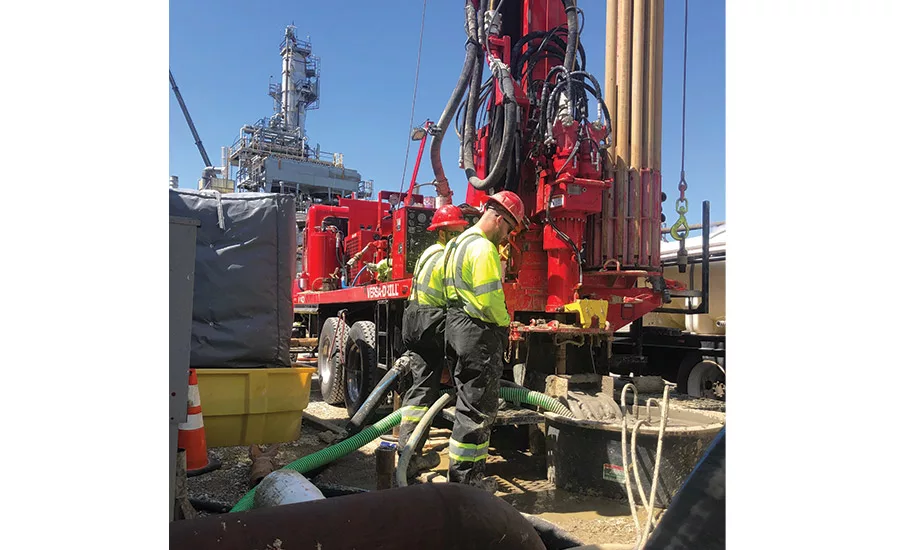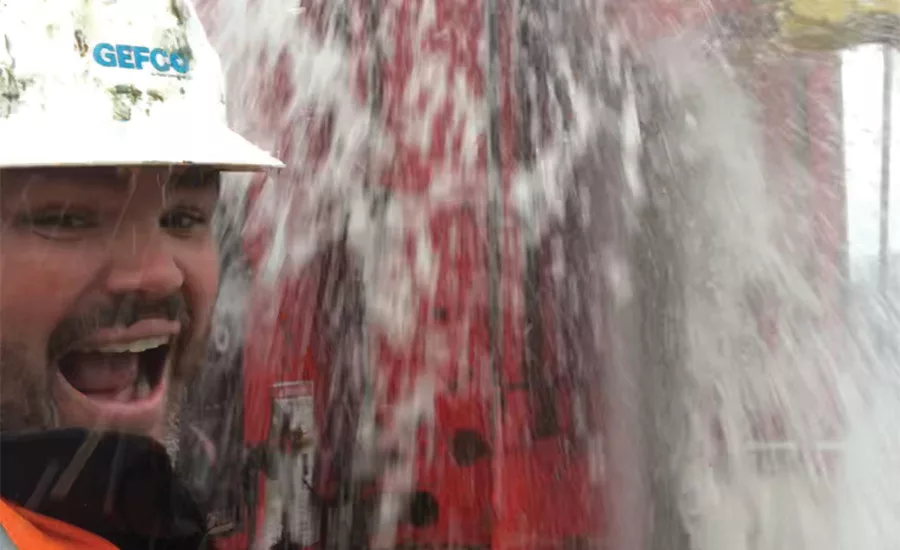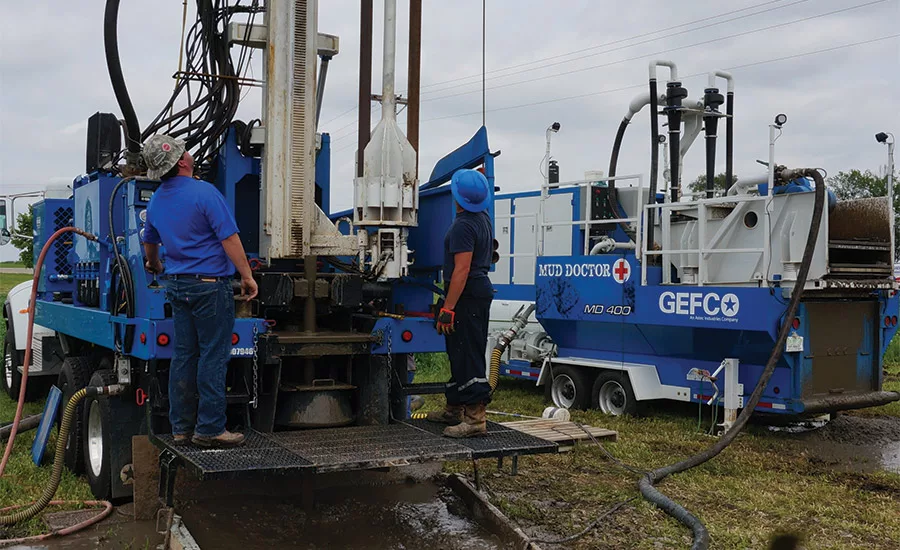How Can I Develop Good Drilling Crews?

Is it luck that helps good drillers succeed? Sometimes. Often, however, success builds on years of field experience combined with training from proven experts.
Source: Brock Yordy

Chuck Yeager next to experimental aircraft Bell X-1. The path he took from cadet to astronaut can inspire people in all professions, including drillers.
Source: U.S. Air Force

Do your drillers love making water come out of the ground? That passion will help them soar to new heights professionally.
Source: Brock Yordy photos

How do you continue to develop drilling skills?
I ask that question to veteran drillers who tell me about a risky project or downhole situation where they created a plan and executed successfully. I also ask that question to drillers when I believe they have missed a critical component to developing into a competent driller. The answer from both drillers is the same: I learned about it in the field.
The goal of all new drillers is to gain the experience to develop into great drillers. All drillers aspire to become experts who can react instantly to downhole conditions, ensuring project success. Great drillers are like the heroic test pilots of the 20th century who helped build our modern-day space program. Great drillers and test pilots like Chuck Yeager share a common bond: instincts that allow for instant reaction. However, those instincts for immediate response did not develop one day out of the blue after watching another operator. They came from a good foundation of learning, project experience and continued growth throughout a career.
Yeager started as a cadet. He turned into an experienced World War II combat pilot, an elite test pilot and, finally, an expert trainer for the emerging space program. Yeager soaked up all his experience from academy to teacher, and never stopped progressing. Drilling companies are like NASA’s Mission Control, guiding drillers as the pilots of individual projects. A company’s culture will determine the type of drillers they guide and the flight plan for project success.
“There is no such thing as a natural-born pilot. Whatever my aptitudes or talents, becoming a proficient pilot was hard work, really a lifetime’s learning experience. For the best pilots, flying is an obsession, the one thing in life they must do continually.
The best pilots fly more than the others; that’s why they’re the best. Experience is everything. The eagerness to learn how and why every piece of equipment works is everything. And luck is everything, too.” — Chuck Yeager
The complex nature of drilling operations has created a culture that considers actual field experience the best and only way a driller and crew can learn. Yes, practical field experience will always be an essential part of growing into a competent decision-maker. However, the quality of the project experience makes the difference between competent and expert. Adding professional development, such as articles, videos and conference learning sessions, to that quality field experience makes a great driller.
As an industry, we have confused good drilling fundamentals that drive drillers to have great drilling instincts with dumb luck. A great driller utilizes drilling fundamentals, along with experiences, to make the educated, fast decisions necessary to change a situation from bad to good. We commonly call these good decisions a driller’s “instincts.” These same instincts allow pilots to maneuver through the air. A driller and team that understand uphole velocity, equipment capabilities, equipment limitations, downhole dynamics, and subsurface conditions have created good instincts that enable them to make the best decisions. The alternative? Drillers trapped into confusing that dumb luck with developed instincts. This trap creates experiences that have little profession growth value, and may even prevent a driller from growing.
Great drilling instincts develop through education and experience combined with good drilling fundamentals and successful smart projects. Quality project experiences, however, need to transfer quickly into quality knowledge shared throughout the company. Once a driller has adopted this mentality, then they can understand and appreciate when good luck comes into play as a teachable lesson that could have turned out bad. Drillers can advance from “pilots” to “astronauts” by correctly interpreting situations that required a little bit of luck, and preventing them from happening again.
“At the moment of truth, there are either reasons or results.” — Chuck Yeager
As a project completes, do you have results or reasons? Consider the last 10 projects your company completed and the outcome of those projects. Did these projects turn out the way you expected? All too often, we consider project completion as success regardless of timeline or profitability. Sadly, there is a reason why it’s called “dumb” luck. What’s unexplainable is how the project ever got completed.
What’s not unexplainable is the year-end balance sheet. What makes impacts on your balance sheet? Projects that complete on time, safely and efficiently make positive impacts on the bottom line. For drill teams to be successful, have a quality development experience and create positive results, they must have a good plan in place before the project starts. A drilling plan starts with a clear, executable outline of project expectations. Next, it addresses specific project components like timeline, materials and risk. If we want men and women who make good choices and continue to grow as drillers, they require all the information and a full understanding of the timeline. A drill team that makes good choices and executes efficiently will have the most significant impact on the project at hand, and on year-end success.
Remember, a team that relies on luck and hope as their plan will always have reasons why the project didn’t turn out as expected. On a drilling project, the only unknown is the subsurface conditions of the borehole. Every other aspect of the job is visible, and we can control the process and methods. Consider a flight plan for travel to the moon. The entire team understands the plan, timeline and risks. The team knows that it will take three days to get there. We create a good drilling plan the same way when we consider all the parameters and equipment limitations. The difference is astronauts do not call Mission Control and say, “Hey Houston, we had a damn good day of drilling, and we made it to total depth early, but Bobby broke the landing gear, and we don’t know if we can land when we return.” The goal of the plan? Ensure project success and create drillers that improve after each project due to quality experiences. It becomes a cycle. Drill teams that make good decisions use their experience to build successful drill plans for the next project.
“You don’t concentrate on risks. You concentrate on results.” – Chuck Yeager
Drilling is a risky business with equipment, processes and projects that present multiple hazards every day. The success of a good drilling company comes from results provided by a great driller, given the best education and experience. As we attend association shows, we see that the median age of drillers is more baby boomer than generation Z. Yeager’s advice to new pilots is exactly what we should teach new drillers. We must develop a drilling culture that sets new drill teams up for success free from the impact of risk. The more education and experience they receive, the better those drillers and teams respond to and minimize risk. However, when a failure occurs, our ability to turn that situation into a teachable lesson while continuing to advance the project determines how a driller handles the next problem. A drill team must respect risky situations while having freedom from them. When our industry embraces a freedom-from-failure concept, we will develop better drillers and crews faster.
“Everybody that I’ve ever seen that enjoyed their job was very good at it.” – Chuck Yeager
Get more tips to help improve your drilling business
In the end, our drill teams have to enjoy what they do. If your drill team doesn’t love making water come out of the ground, it’s time to consider if that’s the root cause preventing them from moving from competent to great. Passion promotes a lifetime of growth, a kind of learning infectious to the rest of the company. Once a company taps into enjoyment and knowledge, there isn’t a borehole out there that can prevent the team’s success. Drilling companies that develop a culture of sharing knowledge and encouraging all employees to seek out continuing education quickly realize they don’t have a recruitment issue. There is nothing better than completing a drilling project and loving the fact that you had an impact on that local infrastructure. Are you hiring operators, test pilots or astronauts?
Looking for a reprint of this article?
From high-res PDFs to custom plaques, order your copy today!





